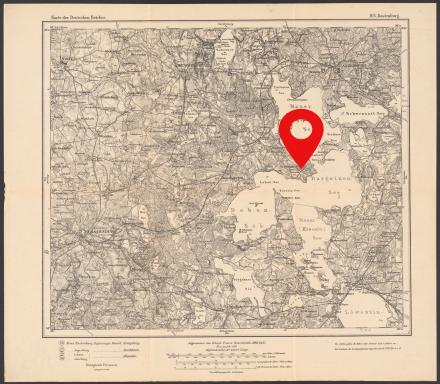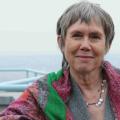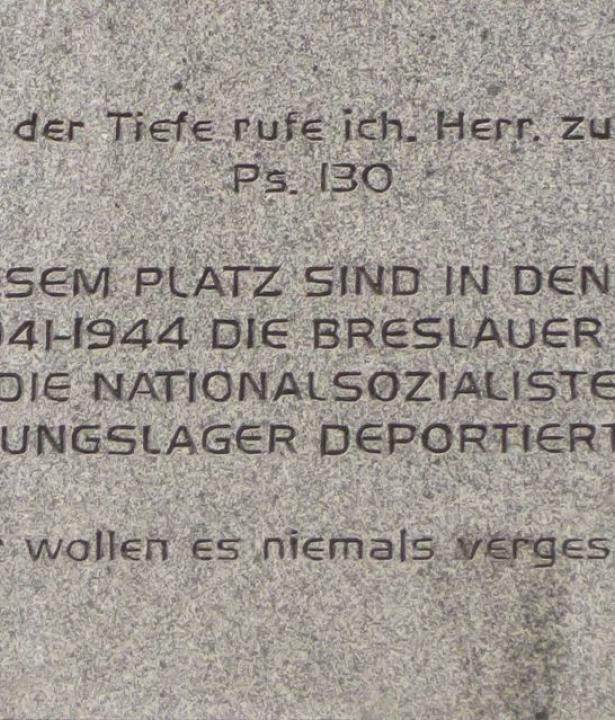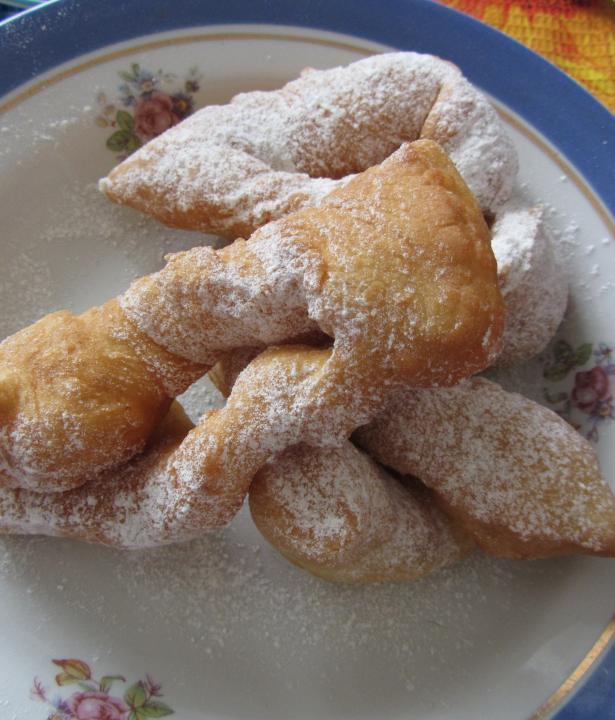"There was no culture of remembrance in my family," says Verus von Plotho. He grew up in a cosmopolitan world. He was born in Sao Paulo, Brazil, in 1969 and grew up in Munich. His mother is Gabriele Freifrau von Plotho, the third daughter of Heinrich and Gottliebe von Lehndorff. There was hardly any talk at home about his grandfather and his resistance to Hitler, nor about his earlier life at Steinort Castle. Grandson Verus grew up – unencumbered – in the shadow of a dramatic past.
Text
From the small hill near the lakeshore, which Verus von Plotho has chosen for our interview, we have an expansive view across the Mauersee. On this August morning it shimmers blue-gray, swallows dive over the lightly rippled surface of the water.1
For several years now, Masuria has been the place he most enjoys spending the summer. Yet this part of the world has not always been on his agenda. As a boy, he barely knew of it; was just a name to him. The few stories of ancestral life he heard were surrounded by tragedy. The only one who spoke openly about it now and then was "famous Aunt Vera," his mother's older sister. Countess Vera Lehndorff (cross-reference to the chapter Four Lehndorff Sisters), at that time known around the world as "Veruschka." To this day, she and Verus von Plotho share a special connection.
For several years now, Masuria has been the place he most enjoys spending the summer. Yet this part of the world has not always been on his agenda. As a boy, he barely knew of it;
Sztynort
deu. Steinort, deu. Groß Steinort
The village of Sztynort is located in the north of the Masurian Lake District on the Jez Peninsula between Jezioro Mamry, Jezioro Dargin and Jezioro Dobskie. Until 1928 the village was called Groß Steinort, then Steinort.


Verus as a 14-year-old on the North Sea mudflats. Verus von Plotho, Free access - no reuse
Verus as a 14-year-old on the North Sea mudflats. Verus von Plotho, Free access - no reuse
Text
It wasn't until he was an adult that he realized, "All four Lehndorff sisters were traumatized in one way or another by the events of their childhood." He knew that whenever his aunt Vera spoke publicly about the execution of their father, Count Heinrich von Lehndorff, and the fate of the family, she could be easily drawn back into the maelstrom of the past.
"Especially my grandmother probably suffered a lot in the first years after July 20, ’44." Gottliebe von Lehndorff opened up to her grandson only once, in the mid-1980s, when he visited her at the Peterskirchen artists' colony. "She told me of life before the assassination attempt, how beautiful it was in Steinort. She also spoke of the fear – how life completely changed from one minute to the next. To lose a husband, with the announcement: in ten days the execution will take place. She was heavily pregnant at the time. She gave birth to her fourth daughter in prison." He will never forget that day with his grandmother; he was fifteen at the time.
"Especially my grandmother probably suffered a lot in the first years after July 20, ’44." Gottliebe von Lehndorff opened up to her grandson only once, in the mid-1980s, when he visited her at the Peterskirchen artists' colony. "She told me of life before the assassination attempt, how beautiful it was in Steinort. She also spoke of the fear – how life completely changed from one minute to the next. To lose a husband, with the announcement: in ten days the execution will take place. She was heavily pregnant at the time. She gave birth to her fourth daughter in prison." He will never forget that day with his grandmother; he was fifteen at the time.


Gottliebe Lehndorff in the garden at Peterskirchen, 1980s. Ostpreußisches Landesmuseum, Free access - no reuse
Gottliebe Lehndorff in the garden at Peterskirchen, 1980s. Ostpreußisches Landesmuseum, Free access - no reuse
Text
"She had a greatness about her. And a wonderful sense of humor, was open to new things," recalls Verus von Plotho. Their relationship was loving and very private. As were his feelings for his grandfather, whom he knew only from stories. Presenting himself publicly as the grandson of a resistance fighter would not have occurred to him. "As an adolescent, you just can’t adorn yourself with something like that.”
In the Federal Republic, the men who were involved with the events of July 20 were long considered traitors to the fatherland. "And the generation of 68 saw them as reactionaries, feudal lords and military men who only acted at the last moment." All the interest, says Verus von Plotho, was fixated on Stauffenberg, as it still is today. "On him and a few others. The fun-loving Heinrich von Lehndorff, who was actually quite apolitical, didn't fit the pattern."
Neither did his widow Gottliebe. She did not want to be one of the "women of July 20" after 1945, like Freya von Moltke or Nina Schenk von Stauffenberg.2
"My grandmother had enough to do in just dealing with her grief. She wanted to go her own way. She was an independent woman, interested in the arts." It was clearly a conscious decision to leave the past behind her – the world of aristocracy, that lifestyle, East Prussia, and any notion of heroism. "Likewise, the daughters, my mother and the three aunts, always lived more in the present than in memory."
In the Federal Republic, the men who were involved with the events of July 20 were long considered traitors to the fatherland. "And the generation of 68 saw them as reactionaries, feudal lords and military men who only acted at the last moment." All the interest, says Verus von Plotho, was fixated on Stauffenberg, as it still is today. "On him and a few others. The fun-loving Heinrich von Lehndorff, who was actually quite apolitical, didn't fit the pattern."
Neither did his widow Gottliebe. She did not want to be one of the "women of July 20" after 1945, like Freya von Moltke or Nina Schenk von Stauffenberg.2
"My grandmother had enough to do in just dealing with her grief. She wanted to go her own way. She was an independent woman, interested in the arts." It was clearly a conscious decision to leave the past behind her – the world of aristocracy, that lifestyle, East Prussia, and any notion of heroism. "Likewise, the daughters, my mother and the three aunts, always lived more in the present than in memory."

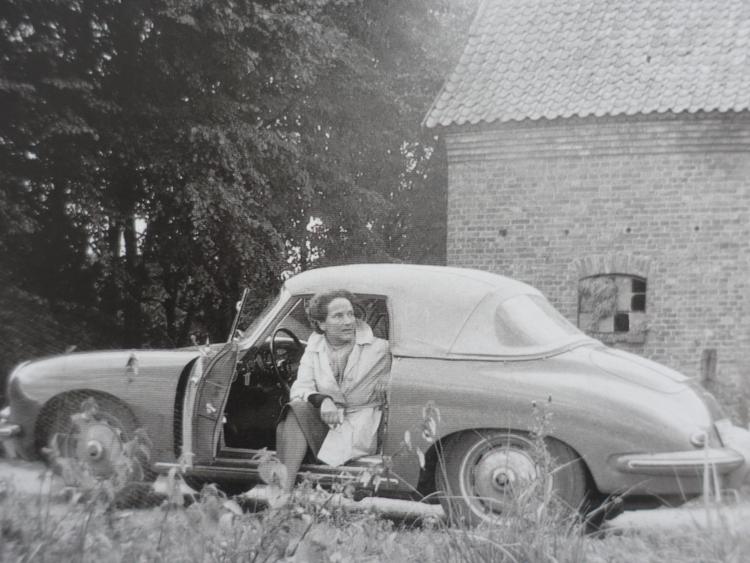
Marion Dönhoff, 1963, in Steinort. Archiv Marion Dönhoff Stiftung, Free access - no reuse
Marion Dönhoff, 1963, in Steinort. Archiv Marion Dönhoff Stiftung, Free access - no reuse
Text
It was his contact with Marion Dönhoff that brought Verus von Plotho closer to history. He read "Namen, die keiner mehr nennt” (Names No Longer Named), "Kindheit in Ostpreußen" (Before the Storm: memories of my youth in old East Prussia) and began to imagine the beauty of Masuria and life in the noble manor houses there.
The famous publicist, Dönhoff, and his grandfather Heinrich were of the same generation; they were cousins and had a very close relationship, culminating in their resistance against Hitler. As a student, Verus was particularly impressed by Marion Dönhoff's clear political stance: her public renunciation of her beloved former homeland in the 1960s had paved the way for reconciliation with.
The famous publicist, Dönhoff, and his grandfather Heinrich were of the same generation; they were cousins and had a very close relationship, culminating in their resistance against Hitler. As a student, Verus was particularly impressed by Marion Dönhoff's clear political stance: her public renunciation of her beloved former homeland in the 1960s had paved the way for reconciliation with
Poland
deu. Polen, pol. Polska
Poland is a state in Central Eastern Europe and is home to approximately 38 million people. The country is the sixth largest member state of the European Union. The capital and biggest city of Poland is Warsaw. Poland is made up of 16 voivodships. The largest river in the country is the Vistula (Polish: Wisła).


Verus von Plotho and his great aunt Marion Dönhoff, 1995. Verus von Plotho privat, Free access - no reuse
Verus von Plotho and his great aunt Marion Dönhoff, 1995. Verus von Plotho privat, Free access - no reuse
Text
She had already returned to Masuria in 1963, for the first time since the war. She drove there from Hamburg, accompanied by her nephew Hermann Hatzfeldt. Among other places, she made a stop in Steinort; the elegant lady in the Porsche caused quite a sensation – people in Sztynort still talk about it today.
With her Leica camera she photographed the vast expanse of Mauersee and the castle, which at that time was still relatively intact.
With her Leica camera she photographed the vast expanse of Mauersee and the castle, which at that time was still relatively intact.
Text
One day Verus von Plotho was sitting by this very lake. He was forty years old, a music manager, a few important chapters of his life already behind him. Born in Brazil, he had studied in London and New York and worked for several record companies, later moving to Berlin, where he became managing director of a well-known music streaming service.
Antje Vollmer’s project "Doppelleben" (double life) provided an important impulse for Verus. During her research on Heinrich and Gottliebe von Lehndorff, she had also interviewed him. "It became clear to me, as well as to others in the family, how little we actually knew." The book, published in 2010, was a gift. A rich trove of sources. Family history, circumstances of the times, astutely and empathically told.
Antje Vollmer’s project "Doppelleben" (double life) provided an important impulse for Verus. During her research on Heinrich and Gottliebe von Lehndorff, she had also interviewed him. "It became clear to me, as well as to others in the family, how little we actually knew." The book, published in 2010, was a gift. A rich trove of sources. Family history, circumstances of the times, astutely and empathically told.


In Boston, 2019. Verus von Plotho, Free access - no reuse
In Boston, 2019. Verus von Plotho, Free access - no reuse
Text
He attended the centenary of his grandfather's birth, which was celebrated in Steinort on June 22, 2009 with the inauguration of a memorial stone at the castle. Almost the entire family, who were living scattered throughout Europe, had come. "It was very emotional." Finally, they had a place to mourn. "After all, there was no grave; his ashes were dumped in the sewage fields outside Berlin."


Family reunion in Steinort in 2009. From left: Verus von Plotho, his sister Anna, Gabriele Freifrau von Plotho. Vera Gräfin Lehndorff, Nona von Haeften, Dirk von Haeften, Josefa von Haeften, Catharina Kappelhoff-Wulff, Christopher Kappelhoff-Wulff. Kilian Heck, Free access - no reuse
Family reunion in Steinort in 2009. From left: Verus von Plotho, his sister Anna, Gabriele Freifrau von Plotho. Vera Gräfin Lehndorff, Nona von Haeften, Dirk von Haeften, Josefa von Haeften, Catharina Kappelhoff-Wulff, Christopher Kappelhoff-Wulff. Kilian Heck, Free access - no reuse
Text
After that, Verus von Plotho spent his summers in Masuria more and more often. He soon became obsessed with the region’s natural beauty, the water, the big skies, "those things that everyone loves." It was important for him to discover this place in his own way, he didn’t want to live only from the past and only be known to the locals as "the Lehndorff grandson.”
Text
It’s a sailor’s paradise. A place of leisure and relaxation, far away from Berlin, where Verus von Plotho lives today. Here, in the Masurian countryside, he came to feel close to his late grandfather. "He was a person who loved nature, hunting, horse-riding. He had a great life, I think."


Mauersee today. Ulla Lachauer, Free access - no reuse
Mauersee today. Ulla Lachauer, Free access - no reuse


Gottliebe Lehndorff with fishermen, around 1940. Archiv Marion Dönhoff Stiftung, Free access - no reuse
Gottliebe Lehndorff with fishermen, around 1940. Archiv Marion Dönhoff Stiftung, Free access - no reuse
Text
Sometimes he looks at his grandparents' wedding photos. A copy of one hangs in the castle as part of a small exhibition. “They had seven good years, from 1937 to 1944." Even in the farewell letter that Heinrich von Lehndorff wrote to Gottliebe the day before his execution, his grandson Verus says, there is still something of the lightness of that earlier life. "Cheerful" is how the doomed man describes his "short life," and that is how he wants to be remembered.
"There's so much in that letter. A deep love for his family. Joy and hope. Courage to follow his conscience and give up everything for it." It's an attitude Verus von Plotho admires, and he's proud of his grandfather today. But to call him a "hero" would be an exaggeration; it would be more accurate to say: "a man who can be an example to us.”
"There's so much in that letter. A deep love for his family. Joy and hope. Courage to follow his conscience and give up everything for it." It's an attitude Verus von Plotho admires, and he's proud of his grandfather today. But to call him a "hero" would be an exaggeration; it would be more accurate to say: "a man who can be an example to us.”


Exhibition in Steinort Palace: The wedding of Gottliebe von Kalnein and Heinrich von Lehndorff, 1937. Familienarchiv Lehndorff, Free access - no reuse
Exhibition in Steinort Palace: The wedding of Gottliebe von Kalnein and Heinrich von Lehndorff, 1937. Familienarchiv Lehndorff, Free access - no reuse
Text
As a representative of the family, he is committed to the preservation and future of the castle. He describes his ideas soberly and clearly: "Steinort Palace is a large building with many rooms." Rescuing it and putting it to use poses a huge challenge. "And it’s in the middle of Poland. It's about the history and needs of the local people."
Text
Regarding the fate of the villagers and their relationship with the palace since 1945, he is adamant: "Their biographies have to be told." In a future exhibition, the aristocratic family of yesteryear and the resistance against Hitler should only be one aspect of many.
Verus von Plotho has now heard many Sztynort stories, the most amazing of which was told to him by Jurek Dacko. His father was deported here from Ukraine in 1941. He worked as a forced laborer for the Lehndorffs in the horse stable and stayed after the end of the war.
More important than the past is the question of what is needed and makes sense here and now: catering for the tourists who come here to sail, restaurants, cafés, a hotel, co-working offices for digital natives, perhaps a forest academy. Vocational training for the economically impoverished region and jobs for the village youth – that’s especially important.
Verus von Plotho has now heard many Sztynort stories, the most amazing of which was told to him by Jurek Dacko. His father was deported here from Ukraine in 1941. He worked as a forced laborer for the Lehndorffs in the horse stable and stayed after the end of the war.
More important than the past is the question of what is needed and makes sense here and now: catering for the tourists who come here to sail, restaurants, cafés, a hotel, co-working offices for digital natives, perhaps a forest academy. Vocational training for the economically impoverished region and jobs for the village youth – that’s especially important.


Verus von Plotho and the Sztynort local Jurek Dacko. Verus von Plotho, Free access - no reuse
Verus von Plotho and the Sztynort local Jurek Dacko. Verus von Plotho, Free access - no reuse
Text
Verus von Plotho hopes that the partnership with the company King Cross, which took over the port and the land around the castle in 2018, will be beneficial. When we met, in August 2020, he was taking a closer look at the overgrown Baroque-style grounds. Since then, the former sight lines have been cleared, and the old oak avenue connecting the teahouse and chapel is passable once more.


The oak avenue in the palace grounds today. Ulla Lachauer, Free access - no reuse
The oak avenue in the palace grounds today. Ulla Lachauer, Free access - no reuse


In the early 1940s. Ostpreußisches Landesmuseum, Free access - no reuse
In the early 1940s. Ostpreußisches Landesmuseum, Free access - no reuse
Text
Some of the gigantic trees dating from the 17th century have died, and parts of the grounds have become marshy. "What can be preserved? There’s a lot to do before the place can be redesigned. And what might garden architecture like this look like today?"
Again, his grandfather comes to mind: it was through this park that Heinrich von Lehndorff fled from the Gestapo on July 20, 1944. After jumping out of a palace window, he ran toward the forest. Here he knew his way around and "could move freely and safely, almost like an animal."
Again, his grandfather comes to mind: it was through this park that Heinrich von Lehndorff fled from the Gestapo on July 20, 1944. After jumping out of a palace window, he ran toward the forest. Here he knew his way around and "could move freely and safely, almost like an animal."
Text
English translation: William Connor


